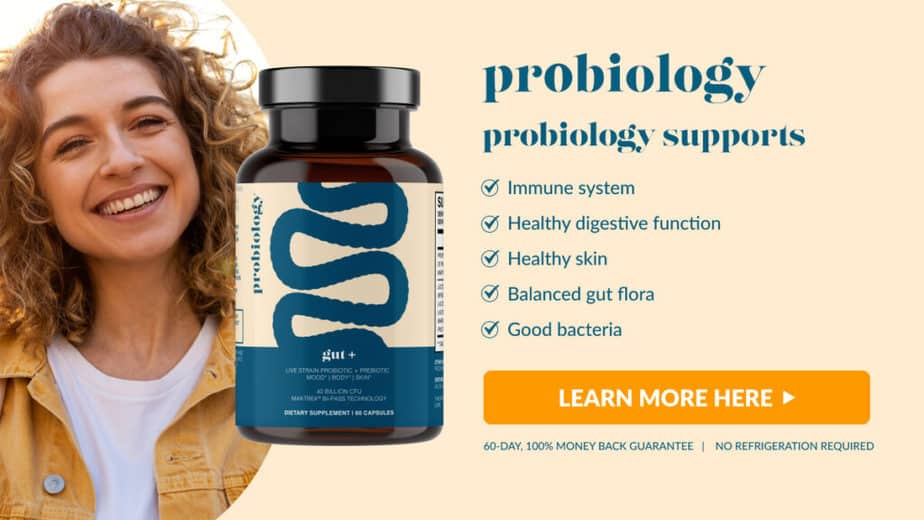Probiotics are often taken to enhance one’s health or ease symptoms of various medical conditions. However, what if the probiotics you’re taking are actually making you feel worse?
A respite from highly irritating foods, drinks, and medications may just be exactly what your gut needs.
Allowing your gut to relax and recover can help you manage your IBS symptoms. The difficult aspect is determining which things, like diets, probiotics, and supplements, are making symptoms worse and which make them better.
Have you ever wondered if probiotics are actually beneficial for IBS? This article will lead you through the most common links between IBS symptoms and probiotics and supplements.
Can Medication Cause IBS?
There are a few medications that can make your IBS symptoms worse, but it’s important not to alter your medications without first visiting your doctor.
Many medications on the market, including antibiotics, anti-anxiety medications, antidepressants, seizure reducing medications and even blood pressure medications can affect bowel motility.
In some cases, your doctor may be able to change your medication to one that has fewer side effects, or even the opposite effect on your bowels.
What About Herbal Supplements?
It is very popular to believe that taking a herbal supplement is safer than taking a prescription drug – and this is not a safe assumption to make.
Herbal supplements, like prescription drugs, contain active ingredients. These chemicals are what allow supplements to be effective. There is credible data to support the use of particular supplements for various illnesses, including IBS.
Unfortunately, herbal supplements can have side effects, like drug induced liver injury, which in rare cases can be fatal. It is important to check with your doctor about any supplements you are taking.
Why Can Probiotics Sometimes Make You Feel Worse?
The amount and type of bacteria that colonize our GI tract, or our microbiome – determines the degree of harmony (or discord) that resides inside it.
Given that these bacteria, yeast, and other species number in the billions, with countless different strains represented, the interplay within us is very intricate and not fully understood.
Our gut bacteria have now been shown to play an important part in practically every bodily process.
This is why introducing new species into the mix might have a transient effect on the environment and the symptoms we experience.
This is especially true for IBS-related symptoms such as bloating, gas, stomach discomfort, and watery stool, which are the most prevalent side effects of probiotics we experience in our clinical practice.
There is a balance within your GI system, and when you utilise probiotics or fermented foods, the balance is momentarily disrupted.
This is not to suggest that the previous balance wasn’t harmful; it’s simply that there was a level of equilibrium that we have now potentially thrown into disarray. The hope is that probiotics aid in the growth and proliferation of beneficial bacteria.
Symptoms may not go away until a new, presumably more favourable, balance is established.
How To Choose A Probiotic Supplement If You Have IBS
A sensitivity to probiotics may be due to the specific product you are using rather than probiotics in general. Here are a few factors to consider when selecting a high-quality probiotic.
- Learn More: Best Probiotics for IBS
Strain Selection
Some strains are more thoroughly researched than others, so consult with your practitioner about what’s best for your condition.
Lactobacillus and bifidobacterium have been shown to be helpful for IBS symptoms, like bloating and abdominal distension. These can be taken separately or in combination.
These are popular probiotic options with the lactobacillus and bifidobacterium strains:
Strain Amount
When it comes to a happy gut, diversity is your ally. Some probiotics may contain just a few strains while others may contain several. There is no evidence proving that having more strains in a product is actually better.
High CFU’s
CFU is an abbreviation for “colony forming units,” and it is used to calculate how many bacteria are present in probiotics.
There is currently not enough evidence to suggest a recommended number of CFU’s. The CFUs listed may also be inaccurate due to the possibility that some of the bacteria die while the product is in transport and on the store shelf.
Manufacturer
Because probiotics are not regulated in many areas of the world, ensuring you receive what you pay for might be tricky.
Finding a probiotic that works for you may be a bit of trial and error with so many different strains and brands on the market.
Probiology is one of the better options out there.

Keep an Eye Out for Filler Ingredients
Many store-bought probiotics contain substances that can aggravate symptoms in some people, such as D-lactate-forming species like Lactobacillus acidophilus, or tapioca and potato starch, maltodextrin, lactose, inulin, pectin, and other prebiotics.
For other articles on probiotics, check these out:



